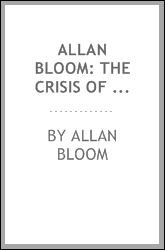The Crisis of American Democracy and Liberal Education: Collected Essays, 1986.
Excerpt:
Therefore a truly political judgment is maintained so long as the issues are matters of life and death. Policy orientation helps keep the focus which we are too likely to lose. It risks degenerating into journalism or pre-occupation with daily affairs; it can also easily involve the temptations of being too immediately useful to power, actual or anticipated. But one can learn a lot even from those who are so involved. And if the temptations are properly controlled, the international stage is one on which the broadest spectrum of political motives can be played. All the aspects of the statesman’s art are revealed there. The relation between the predictable and the unpredictable, nature and chance, become serious questions and can be concretely posed. The relation between justice and survival, principle and expediency, come best to light. The necessity and the difficulty of judging between conflicting complaints become manifest. Most of all, the harsh side of life and the real problem of combining humaneness with success can be shown to young people without experience of necessity and imbued with great hopes. Living through the problems of foreign affairs is a good education in the nobility and baseness of political life and helps the student to liberate himself from the doctrinairisms of principle and method. At best it can lead him to contemplate the alternatives contained in the somber gentleness of Thucydides, the hopeful brutality of Machiavelli, and the strict moralism of Kant.
I am not arguing that a similar movement from the practice of politics to the primary theoretical issues could not be made on the basis of American politics. But given he current state of the discipline it is much harder to do so. Aron and Kissinger are closer to politics and to philosophy than are Dahl and Easton.
Online:
Internet Archive

